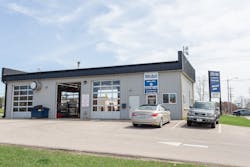SHOP STATS: Little Wolf Automotive Express Lube, Location: Two locations: Waupaca, Wisc. and Antigo, Wisc. (Opened in Jan. 2020) Operator: Scott Bickley Average Daily Car Count: 30 (Waupaca), 9 (Antigo) Staff Size: 5 (Waupaca), 3 (Antigo) Shop Size: 2 bays, 1 alignment rack (Waupaca), 2 bays (Antigo) Ticket Average: $82 (Waupaca), $65 (Antigo)
Shops are always trying to evolve. That means staying up to date on the latest technology and trends, but that also means keeping your shop in tip top shape. The shop’s overall appearance can have a big effect on the customers choices.
Scott Bickley, owner of Little Wolf Auto Repair in Waupaca, Wis., has gone through both a remodel and rebuild. The changes have been fruitful for Bickley and his business, but the process wasn’t easy.
Whether it’s just a face lift or a total restart, there’s plenty of things shops should know before they start their own rebuild.
The Challenge
In a span of five years, Bickley rebuilt his repair shop next to one of his quick lubes in Waupaca, and remodeled his second quick lube shop in Antigo, Wis. Working with two different cities on two different projects resulted in a slew of confusing tasks. The challenge was making the process as smooth and efficient as possible.
The Solutions
Stay up to date on codes.
When a shop is remodeling, not only will the new additions and changes need to be up to code, but the rest of the facility will need to be too.
Even if the renovation plans to only include a new waiting room, if other aspects like the break room or bathroom don’t meet code, inspectors often won’t allow anything to happen until that code is met. And just because your building was up to code 10 years ago, doesn’t mean it is now. Local codes and regulations are always changing.
“When you remodel, you open yourself up to old code,” says Brian Carter, operations director for Shinn Buildings, which builds quick lube and car washes around the country, “and bathrooms are the most susceptible.”
During Bickley’s remodel of his quick lube, he found the bathroom needed major changes to meet code. It was about the size of the bathroom at his house, but businesses must meet ADA compliance. In order to meet the requirements, Bickley had to expand the bathroom and include sinks, faucets and hand dryers that could be accessed from a wheelchair. The bathroom was just one of many renovations he made to the quick lube.
Don’t skip steps.
In any remodel or rebuild, especially one that drags on, it can be tempting to jump ahead. Carter recalls a recent project that required them to take down an entire ceiling just hours after they put it up. The city inspector had not yet come to inspect the gas line and couldn’t complete the inspection with the ceiling in place.
In Bickley’s latest remodel, he hoped to do all the plumbing and electrical work himself. He had experience working on it with home projects and felt he could easily complete the work. But he wasn’t licensed, which is a requirement for commercial renovations. So he was forced to hire out the work. Had he gone ahead with the remodel himself, he would’ve opened up potential liability down the road.
Understand that cities often move slow. That’s just how it goes, Carter says. But trying to skip steps will always come back to bite you.
Be patient.
The process is going to take longer than you think, Bickley says. In the rebuilding of his repair shop in Waupaca, he had to request a month in advance to get on the city council’s meeting agenda. Then it took three additional city council meetings before he was approved to start building.
During the entire process, Bickley and his builder were in communication with the city, which was constantly requiring them to make changes to their plans. Among many things, the city requested Bickell to lay three feet of brick along the outside of the building, an added cost in both time and materials.
Carter frequently has to readjust his clients’ expectations. From securing funding, to hiring and planning, to getting the project approved, to finally building, the process almost always takes a year.
“You just cannot be in a hurry,” Carter says. “It’s not a fast process.”
The Aftermath
After the rebuild, Bickley’s repair shop saw its average repair order go from $350 to $700, and the quick lube that is located right next to it saw its average go from $65 to $78. Bickley’s latest remodel on the second quick lube was finished in January and the exact results aren’t clear yet.
The Takeaway
The renovation process will likely be a bit painful. Make sure to be informed about what the specific city requires, understand the process may take time and budget accordingly. Those steps will lead to the smoothest and quickest results. The hassle of remodeling will be offset by the customer's satisfaction.
